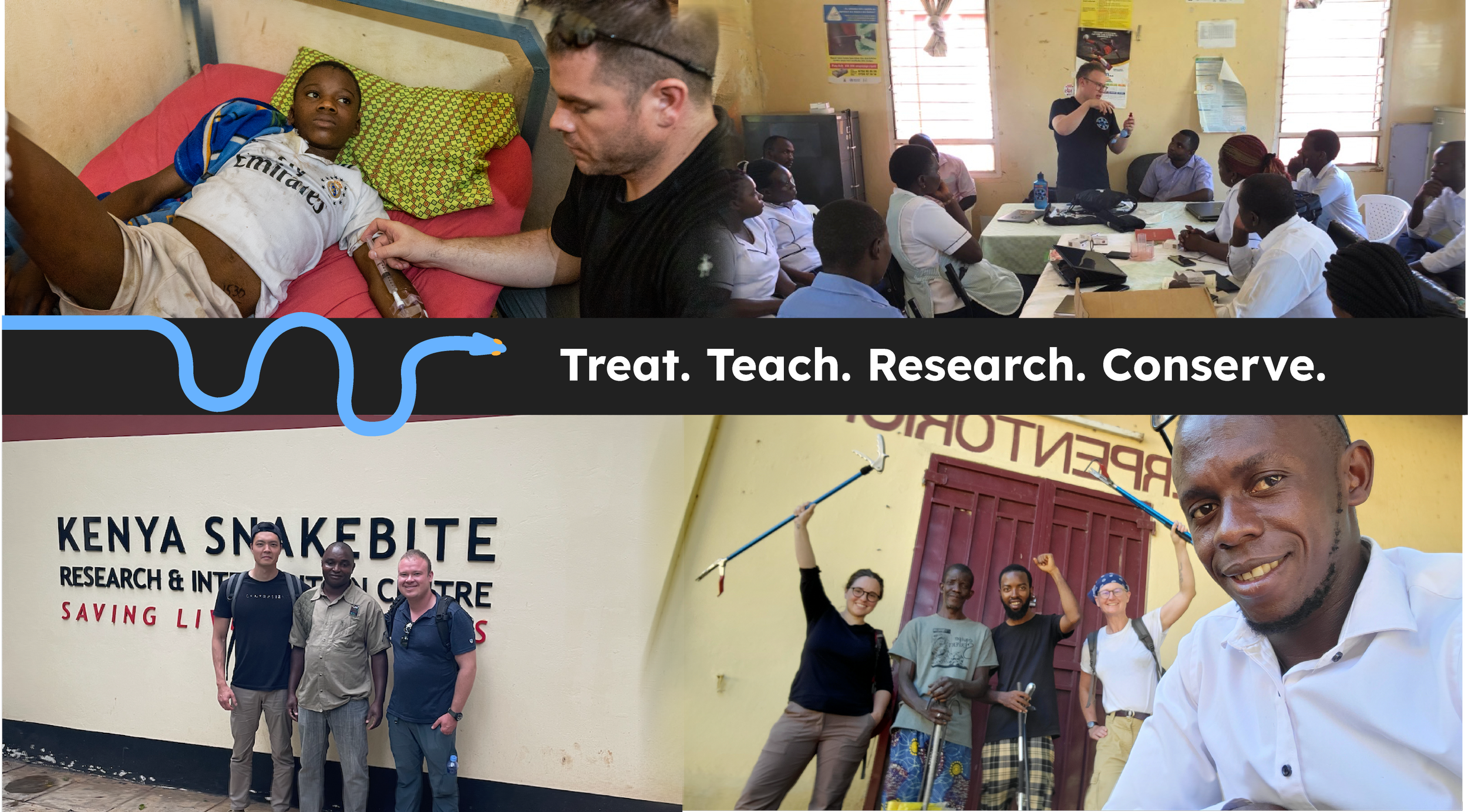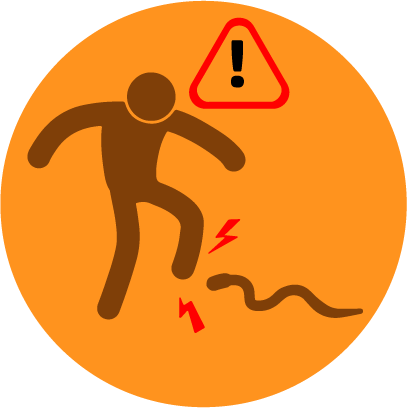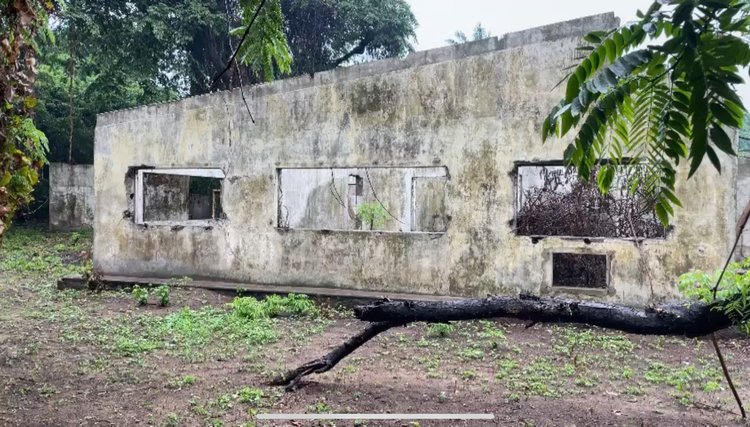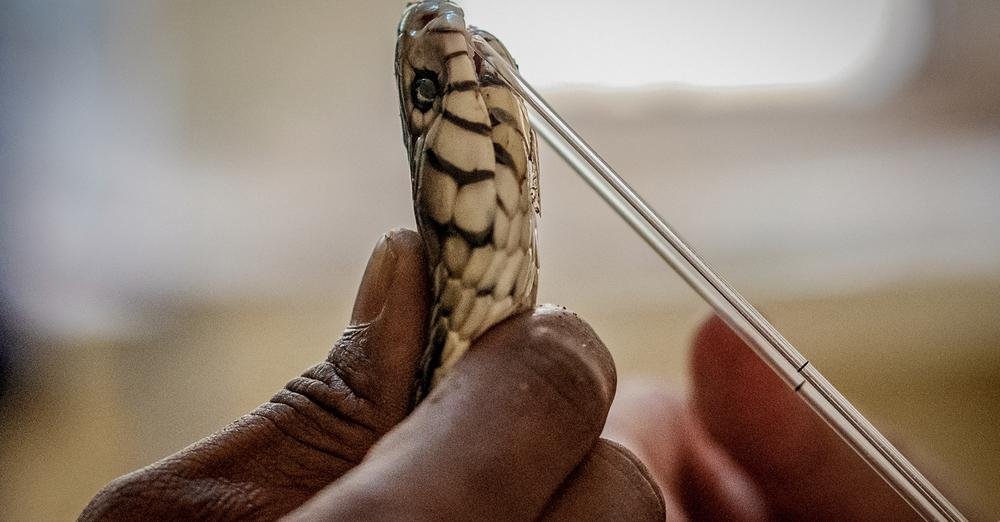
-
After partnering with the Guinean clinical team in 2018, ASF's flagship Snakebite Center of Excellence opened in Kindia, Guinea in 2023. By providing medical training, supplies, and antivenom, ASF has helped to decrease snakebite deaths among patients who make it to the clinic from 30% to less than 2%.
We are currently working toward building our second Snakebite Center in the Republic of the Congo, to save even more lives and limbs from snakebite.
Learn more about our Snakebite Centers below!
-
Many existing medical facilities are capable of treating snakebites but lack the training and resources to do so. ASF offers education on proper snakebite management to healthcare providers around the world.
Our team establishes relationships with hospitals and clinics, provides training for their staff, offers guidance on antivenom procurement, and serves as an expert resource during challenging cases. Working with existing healthcare facilities, we can expand our reach and protect more high-risk communities.
Read about our partnership in Sierra Leone below.
-
Snake venoms are complex mixtures of bioactive molecules. Venoms can vary wildly in their composition, and each venom component causes unique harms to snakebite victims. Understanding associations between venom composition and snakebite syndromes is critical to improving patient care.
Dr. Cara Smith is working to collect and analyze the venoms of the snakes of Guinea. Her research will help us to better understand the potential effects of bites from different snake species, and to improve treatment plans for snakebite victims.
Read more about this important research below!
-
Snakes play a vital ecological role, but they and other herpetofauna (reptiles and amphibians) are facing a variety of global threats, from habitat destruction to poaching to disease. Surveying the snakes of the areas we serve not only helps to improve conservation efforts, but it also provides a foundation on which our snakebite research can build.
ASF’s director of herpetology, Dr. Kate Jackson, works with a team of international herpetologists to document snake diversity in the countries we serve. Understanding which snakes are found in an area can help us to improve snakebite management and to promote public health initiatives to lower snakebite risks.
Read more about the important herpetological conservation work ASF is doing below!
Multidimensional Approach
Understanding the problem is the first step to the solution. The “Vicious Circle of Snakebite” is a tragic, recurrent cycle of misinformation and underreporting, leading to ineffective treatment or lack of demand for antivenom. Simple communication and education can make a substantial impact. Can you spare four minutes to build a bridge to the solution?

Develop and Expand Snakebite Clinics
“If you’re not there, you won’t ever grasp the scope or complexity of the problem… snakebite isn’t solved in a boardroom in Geneva. It needs to be solved on the ground, by people working on the ground, in Africa. It’s people going out and working.”
- Jordan Benjamin, ASF Founder
Establishing the foundation for snakebite centers of excellence begins with identifying regions in the greatest need.
Guinea
ASF’s Flagship Snakebite Clinic
Guinea is a small West African country with one of the highest burdens of snakebite on the continent. The ASF Guinea team estimates a burden of 24000 envenomations, 3600 deaths, and 4600 amputations and other disabilities every year - approximately 15 times higher than previous estimates indicated.
Snakebite in Guinea is complicated by an unusually high number of bites by neurotoxic cobras and mambas that account for roughly 30% of bites and over 70% of fatalities seen at the clinic every year. Some of the Guinean snake species can kill within an hour by paralyzing the respiratory muscles, and many patients die before ever reaching a clinic.
In 2023, ASF opened its flagship Snakebite Center of Excellence in Kindia. Working with Guinean clinicians to provide life-saving antivenom and supportive care, we have seen a reduction in mortality from snakebites at the clinic from 30% to under 2%.
Congo
Breaking Ground in New Land
In the Republic of the Congo, where snake conservation and the incidence of snakebites pose significant challenges, the Asclepius Snakebite Foundation is taking a groundbreaking step forward. The Foundation is dedicated to constructing the country's first clinic specifically designed to treat snakebites. This initiative not only aims to provide immediate and effective medical care to those affected by snakebites but also integrates local conservation efforts to protect snake habitats and promote ecological awareness. By establishing this clinic, the Asclepius Snakebite Foundation hopes to reduce the mortality and morbidity associated with snakebites and foster a harmonious coexistence between humans and snakes, enhancing both public health and wildlife conservation.
Sierra Leone
ASF & Bridge of Hope Partnership
The Asclepius Snakebite Foundation has formed a strategic partnership with Bridge of Hope in Makeni, Sierra Leone, to enhance snakebite prevention and treatment. This collaboration focuses on strengthening community resilience against snakebites by providing essential education on prevention techniques and immediate care strategies.
Bridge of Hope's deep community ties and infrastructure support the foundation's efforts to disseminate life-saving knowledge and resources effectively. Together, they are setting up initiatives that include training healthcare workers, supplying antivenoms, and conducting public awareness campaigns. This partnership is crucial in building a robust response system that not only saves lives but also improves the overall community health infrastructure in Makeni.
Venomics Research & Herpetology Conservation
Establishing the foundation for snakebite centers of excellence begins with identifying regions in the greatest need.
Venomics Research
Advancing Venom Therapies and Pharmacology
Dr. Cara Smith is at the forefront of venomics research, exploring the complex chemistry of snake venoms to revolutionize medical treatments. In a cutting edge lab, Dr. Smith delves into the molecular structures and biological functions of venom components, seeking to uncover new insights that can lead to advanced antivenom therapies.
Her work aims not only to improve our understanding of venoms but also to improve treatments for snakebite victims. Dr. Smith's research is critical in bridging the gap between traditional antivenom strategies and next-generation biomedical innovations.
Herpetology Conservation
Finding Balance in Co-existence
The Asclepius Snakebite Foundation's herpetology team is actively involved in pivotal conservation efforts in Guinea and the Republic of the Congo. This dedicated group of experts focuses on the preservation of snake habitats and the promotion of biodiversity, crucial for maintaining ecological balance and reducing human-snake conflicts. Their fieldwork not only aids in the protection of endangered snake species but also supports the development of sustainable practices that benefit both local wildlife and human populations. This work is essential for crafting long-term solutions to snakebite incidents, aligning conservation goals with public health initiatives.
Our teams carry out biodiversity surveys of snakes and other amphibians and reptiles in Guinea and in the Republic of the Congo, identifying and documenting what species are found in differet areas, how abundant they are, and how they make use of different habitats. These surveys provide a crucial foundation on which conservation initatives can build. In addition to the impact of our work at the local level, our experts also contribute to larger, continent-level conservation and snakebite initiatives.
Training, Community Education and Consulting
When considering the vast branches of medicine, snakebite is a niche area many facilities are capable to treat, but lack training for proper snakebite management.
Consulting
Connect with ASF for Per-Case Consultations
Snakebite is a global health crisis. Even in the USA where antivenom is readily available, many healthcare providers and bite victims are hesitant to receive the life-saving treatment due to misinformation based on old wives’ tales and/or horrifically inaccurate social media posts.
In the USA, roughly 6,000 - 8,000 venomous snakebites occur annually. Most snakebites occur when people unintentionally interact with snakes.
The ASF team has several physicians who consult on snakebites in the USA as part of their practice. The team also works on blogs and other social outreach programs, helping people understand how to properly advocate for effective care and coexist with all snakes.
Venom Conferences
Snakebite Education
Venom conferences play a crucial role in fostering collaboration, innovation, and education in the field of snakebite management. Conferences provide continuing education opportunities for all healthcare providers in human and veterinary medicine. Additionally, snake and venom enthusiasts alike enjoy the opportunity to connect with experts in the field.
This widespread participation not only promotes proper snakebite management, but also aids in tackling other field related challenges. One constant struggle is the pressure on US zoos to forfeit their exotic antivenoms for private venomous keepers that fail to stock their own antivenom.
























